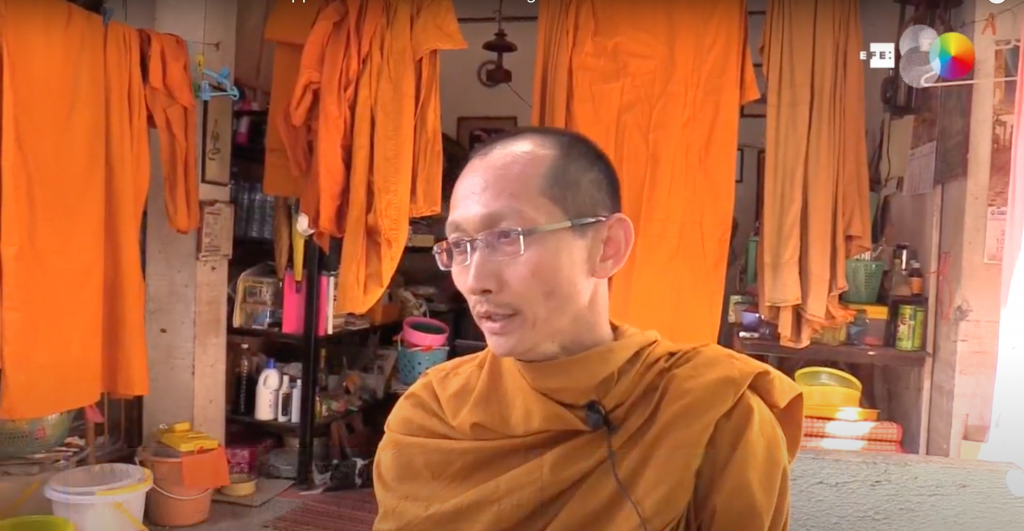Nothing is permanent, so everything is precious. Here’s a selection of some happenings—fleeting or otherwise—in the Buddhist world this week.
Thai Monk Speaks Out About LGBT+ Rights
As Thailand prepares to pass a landmark civil partnerships bill that would recognize same-sex unions with nearly the same legal rights as heterosexual couples, one Buddhist monk is openly showing his support for the LGBT+ community. According to the nonprofit arm of the Reuters news service, the Thomson Reuters Foundation (TRF), 52-year-old Shine Waradhammo has been attending LGBT+ events in Thailand, where his saffron robe and shaved head are often conspicuous, and posts frequently on social media about issues affecting the queer community. “He is quite exceptional; it is not common to see a Buddhist monk take such an interest in these issues, and be vocal and supportive, and even show up at events,” Anjana Suvarnanda, co-founder of the LGBT+ organization Anjaree Group, told TRF. “He also helps us frame the argument from the religious perspective, reminding people of the Buddhist philosophy of accepting all people. If we had more monks like him, it would make a real difference.”
If the Civil Partnership Bill is passed, Thailand will be the second country in Asia after Taiwan to allow the registration of same-sex unions. But Waradhammo says it doesn’t go far enough. He supports a separate initiative that seeks to change the Civil Code, Thailand’s main body of laws, so that marriage is defined as being between two persons rather than between a man and a woman. “The Civil Partnership Bill does not give equal rights [to gay couples],” he said. “Changing the Civil Code would be better.”
In Theravada Buddhism, LGBT+ people are sometimes seen as paying the price for bad karma from a previous life, Waradhammo told TRF. But he doesn’t agree. “The Buddha never said anything against LGBT people, so it is a very wrong interpretation of the scriptures that leads to bias and rejection of LGBT people. Monks generally avoid talking about LGBT and gender issues, but we should be talking about issues that affect society, and religious teachings have to reflect the present times—otherwise religion becomes a dinosaur.”
Resettlement Prospects Look Bleak for Rohingya Refugees from Myanmar
Resettlement for Rohingya Muslim refugees fleeing Myanmar has become even more dangerous as countries like Malaysia have closed their borders and threatened to push boats back to sea to protect jobs and resources amid coronavirus lockdowns, according to Reuters. In 2018 and 2019, two attempts at a repatriation process failed when refugees refused to return to Myanmar, a Buddhist-majority country where the ethnic minority has been denied citizenship and where the military’s campaign of violence against them forced millions to flee to neighboring Bangladesh.
Bangladesh used to run a resettlement program that offered a way for refugees to find permanent homes, but they ended that program in 2010. Bangladesh’s refugee commissioner told Reuters that if the government resumed the program, they would focus on resettling refugees in other countries. H.T. Imam, a political advisor to Bangladesh’s prime minister, however, has called that process unrealistic because European countries and the US are so reluctant to accept Muslim refugees.
Buddhist Monk’s Reputation Destroyed in Government Smear Campaign on Facebook
Buddhist monk Luon Sovath, who had spent decades fighting for the human rights of his fellow Cambodians, was the victim of a Facebook smear campaign backed by the Cambodian government. An investigation by the New York Times found that government employees were involved in creation of fake social media accounts and false claims that led to the takedown and eventual exile of Luon Sovath, who has been an outspoken critic of his country’s authoritarian policies. After grainy videos appeared on a fake Facebook page, claims began circulating that the monk had slept with three sisters and their mother. A government-controlled religious council then defrocked Luon Sovath, alleging that he had broken the monastic precept of celibacy. Fearing imminent arrest, the monk fled Cambodia for Thailand, where he now lives in exile. Luon Sovath’s plight draws attention to the fact that the Cambodian government can easily use Facebook, the only digital interface for millions of people in the country, to crack down on dissidents. Under Cambodian Prime Minister Hun Sen, the government has repeatedly used falsified Facebook posts or manipulated audio to denigrate and imprison politicians, activists, and other human rights defenders.
Remains Found in Japan Suggest 1800s Epidemic
Archaeologists in Osaka, Japan, dug up remains of more than 1,500 people who were buried in a 19th century mass grave, reported the Associated Press. Some graves were small round holes with bodies apparently stacked and buried together; others contained coffins with multiple remains. Experts cited these as signs that many victims of an epidemic were buried together. Lesions on limbs of the remains suggest that there may have been a syphilis outbreak, which was rampant in the 1800s in populated areas like Osaka. Archaeologists also found coins, Buddhist prayer beads, headdresses, combs, sake cups, and clay dolls, which has taught them more about regional burial practices.
Thank you for subscribing to Tricycle! As a nonprofit, we depend on readers like you to keep Buddhist teachings and practices widely available.
